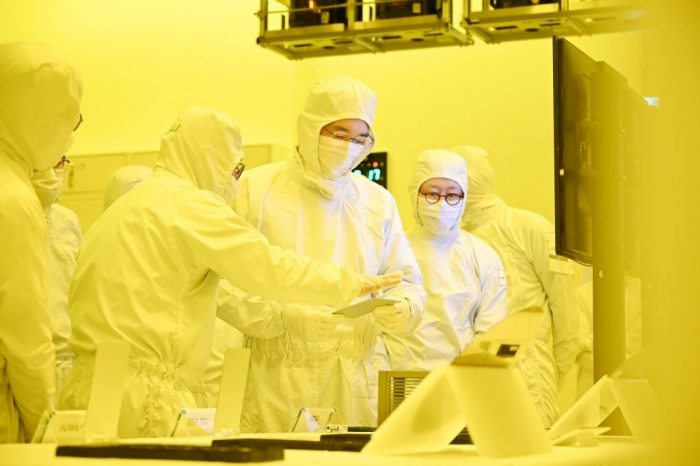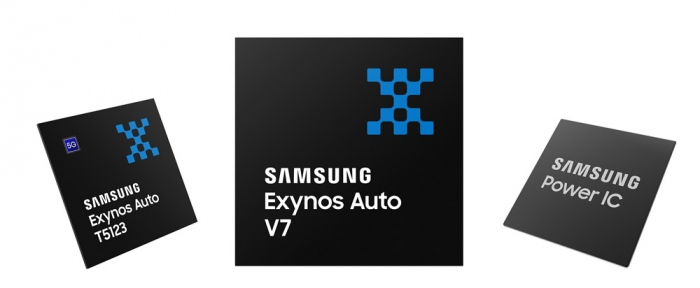Korean chipmakers
Samsung foundry backlogs top $74.6 bn for logic chip biz goal
Samsung fabless unit also expands its scope as the S.Korean tech giant aims to rule the global system semiconductor market by 2030
By Apr 30, 2023 (Gmt+09:00)
3
Min read
Most Read
LG Chem to sell water filter business to Glenwood PE for $692 million


KT&G eyes overseas M&A after rejecting activist fund's offer


Kyobo Life poised to buy Japan’s SBI Group-owned savings bank


StockX in merger talks with Naver’s online reseller Kream


Meritz backs half of ex-manager’s $210 mn hedge fund



Samsung Electronics Co., the world’s No. 2 foundry player, has secured contract semiconductor manufacturing order backlogs of more than 100 trillion won ($74.6 billion) with sales from its non-memory businesses more than doubling, boding well for its future growth engine.
Samsung said on Sunday that its sales from the system semiconductor business – including its system LSI, which is in charge of the fabless sector, and foundry divisions – rose to 29.9 trillion won last year from 13.9 trillion won in 2018.
The global system semiconductor market is as much as four times larger than the memory chip sector. The logic chip market is expected to total 620 trillion won this year, slightly less than quadruple the memory chip industry's 179 trillion won, according to US technological research and consulting firm Gartner Inc.
Samsung, the world’s top memory chipmaker, has been striving to expand its market share in the system semiconductor sector. Its Chairman Jay Y. Lee in 2019 unveiled a goal to dominate the sector by 2030 with investments of 133 trillion won.
GROWING FOUNDRY BUSINESS
Sales of its foundry unit have been increasing since then. The division last year reportedly logged a revenue of more than 20 trillion won with record-breaking sales every quarter.
The company accounted for 15.8% of the industry as of October-December 2022, following the world’s top Taiwan Semiconductor Manufacturing Co. (TSMC) with a market share of 58.5%.
Samsung, however, secured cutting-edge technology to take on the industry leader. The South Korean tech giant introduced 7-nanometer foundry processing with extreme ultraviolet (EUV) lithography equipment for the first time in the world in 2019. The company kicked off mass production of 3 nm chips last June, faster than TSMC, based on its first-generation gate-all-around (GAA) transistor technology.
The manufacturing yield, the metric that measures the probability of getting good products from manufacturing processes, for 3 nm and 4 nm chips was known to have increased to normal levels.
The client base is also growing as its customers include Big Tech such as Alphabet Inc. of Google and Qualcomm.
AP, AUTOMOTIVE CHIPS
Samsung’s system LSI division, the world’s second-largest image sensor supplier after Sony Corp., developed the world’s first 200 million-pixel product to sell to Chinese smartphone makers such as Xiaomi Inc.
Sales of Samsung’s mobile application processor Exynos are likely to rebound as the company seeks to install the chipset into the new flagship smartphone Galaxy S24. The Samsung Galaxy S23 line unveiled in February is equipped with Qualcomm’s AP.
Samsung is actively expanding its presence in the automotive chip market. The company developed the Exynos Auto series, an automotive system on chip (SoC), as well as image sensors for global carmakers such as Volkswagen AG and Audi AG.

The tech behemoth needs to recruit more talent to take the throne of the global system semiconductor industry by 2030. Currently, its number of skilled engineers in both the foundry and system LSI units is known to be less than half those of TSMC and Qualcomm.
“Samsung needs to improve its long-term competitiveness while enhancing its business fundamentals,” said a semiconductor professor.
Write to Jeong-Soo Hwang at hjs@hankyung.com
Jongwoo Cheon edited this article.
More to Read
-
 ElectronicsSamsung unveils Galaxy S23 with better camera, processor
ElectronicsSamsung unveils Galaxy S23 with better camera, processorFeb 02, 2023 (Gmt+09:00)
3 Min read -
 Korean chipmakersSamsung's foundry sales nearly match DRAM revenue
Korean chipmakersSamsung's foundry sales nearly match DRAM revenueMar 20, 2023 (Gmt+09:00)
2 Min read -
 Korean chipmakersSystem on chips: Samsung’s new high-stakes foundry business
Korean chipmakersSystem on chips: Samsung’s new high-stakes foundry businessMar 09, 2023 (Gmt+09:00)
2 Min read -
 Korean chipmakersSamsung’s 3 nm chip production yield rises sharply
Korean chipmakersSamsung’s 3 nm chip production yield rises sharplyJan 09, 2023 (Gmt+09:00)
2 Min read -
 Korean chipmakersSamsung's 3 nm chip narrows microchip gap with TSMC
Korean chipmakersSamsung's 3 nm chip narrows microchip gap with TSMCJun 30, 2022 (Gmt+09:00)
3 Min read
Comment 0
LOG IN


